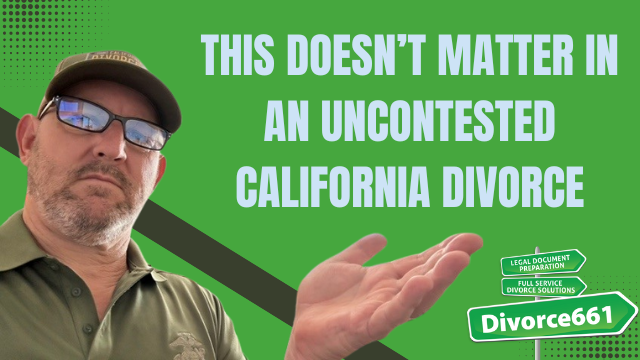👎 THIS DOESN’T MATTER in an UNCONTESTED CALIFORNIA DIVORCE
Divorce can be a complicated and stressful process, especially when emotions run high and misunderstandings cloud the path forward. However, when it comes to uncontested divorces in California, many common concerns and mistakes simply don’t carry the weight people think they do. In this article, inspired by insights from Tim Blankenship of Divorce661, we’ll explore one of the top mistakes men—and really anyone—make during a divorce: not filing first. Understanding this can help you navigate your divorce with more confidence and less unnecessary worry.
The Importance of Filing First in Divorce
One of the most frequent missteps seen in divorce cases, particularly among men, is the hesitation or failure to file first. While it may seem like a minor procedural detail, filing first in a divorce can actually provide some strategic advantages in the process.
Why Filing First Matters
Filing first essentially means you are the one initiating the divorce process by submitting the petition to the court. This can set the tone for the proceedings and sometimes allows you to control certain timelines and aspects of the case. For example, the petitioner usually gets to choose the county where the divorce will be filed, which can be beneficial if you want the case handled closer to home or in a more familiar jurisdiction.
Additionally, filing first can influence how and when financial disclosures are made, and it may give you an earlier opportunity to propose terms and agreements. While these factors might not be decisive in an uncontested divorce—where both parties agree on the terms—they can still provide a sense of agency and preparedness.
Common Concerns Around Filing First
Many people worry that filing first might appear aggressive or that it will somehow disadvantage them emotionally or legally. The truth is, in uncontested divorces where cooperation exists, filing first is often a neutral action—it simply starts the process.
Tim Blankenship points out that this is one of the mistakes people make, not because filing first will drastically change the outcome, but because waiting to file can cause unnecessary delays and added stress. In uncontested cases, the priority should be moving forward efficiently rather than worrying about who files first.
Other Considerations in Uncontested California Divorces
While the focus here is on the significance of filing first, it’s important to remember that uncontested divorces are meant to be straightforward. Since both parties agree on all terms—such as property division, child custody, and support—many typical divorce battles are avoided.
This means that many factors often feared or debated in contested divorces don’t really matter. For example, the “who gets what” arguments or the timing of filings are less critical when cooperation and agreement are present.
Tips for a Smooth Uncontested Divorce
- File as soon as you’re ready: Don’t delay initiating the process once you and your spouse have agreed on terms.
- Communicate clearly: Keep open lines of communication to avoid misunderstandings that can complicate the process.
- Understand the paperwork: Ensure all forms are correctly filled out and submitted to avoid delays.
- Seek professional advice if needed: Even in uncontested cases, consulting with a divorce professional can help clarify your rights and responsibilities.
Conclusion
In uncontested California divorces, many fears and concerns simply don’t hold as much weight as people assume. One of the top mistakes, especially among men, is not filing first. While it’s not a make-or-break factor, filing first can help keep the process on track and reduce unnecessary delays.
Remember, the goal in an uncontested divorce is to handle the process efficiently and amicably. By understanding what truly matters—and what doesn’t—you can approach your divorce with confidence and clarity.
For more insights and guidance on navigating divorce, follow Tim Blankenship at Divorce661 and stay informed about the realities of divorce in California.

